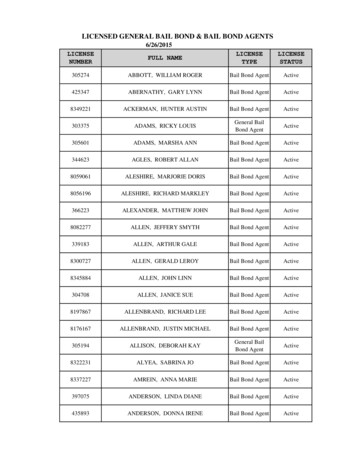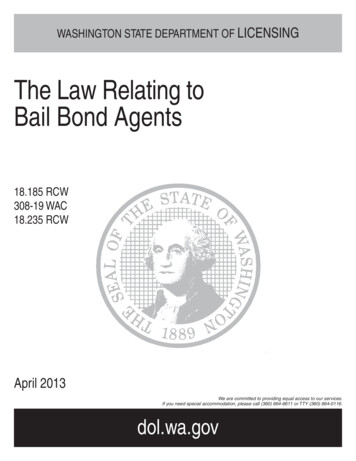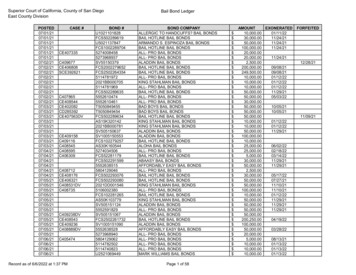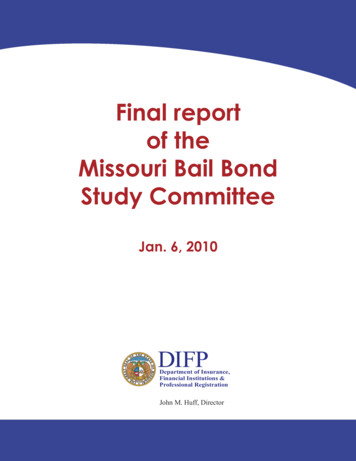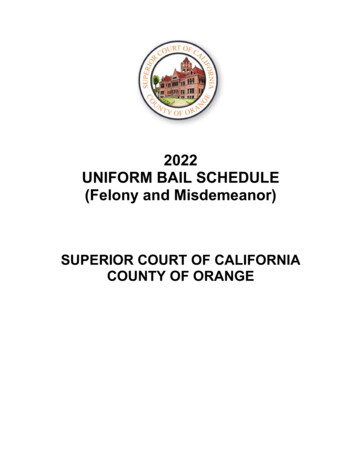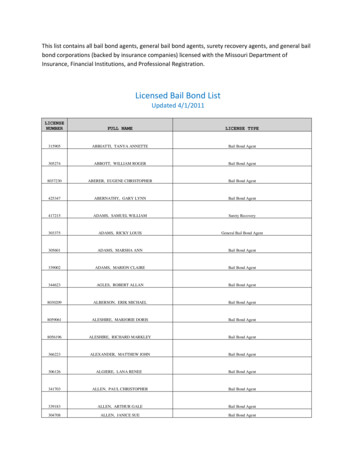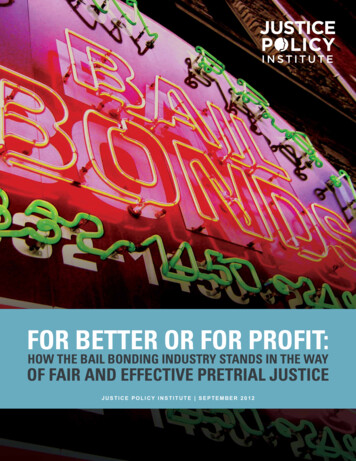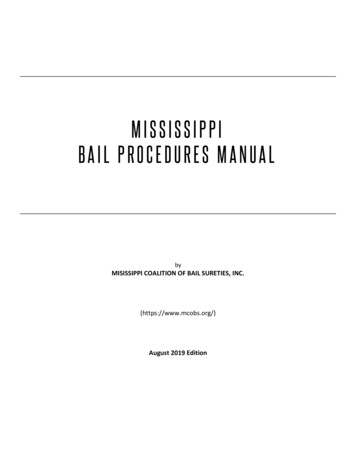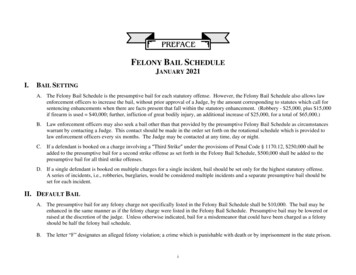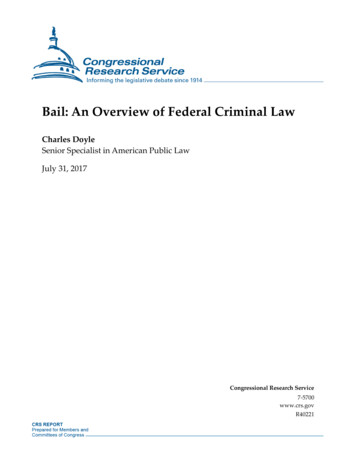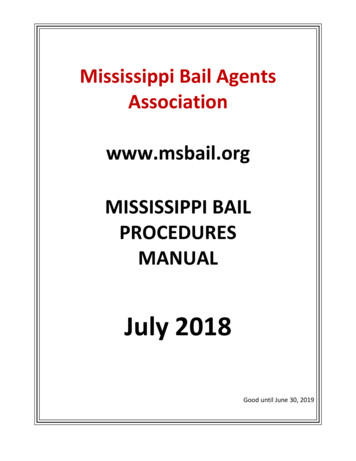
Transcription
Mississippi Bail AgentsAssociationwww.msbail.orgMISSISSIPPI BAILPROCEDURESMANUALJuly 2018Good until June 30, 2019
COURT CLERKS AND THE BAIL BOND INDUSTRYPreface2Requirements for Accepting Bonds3Bond Forfeitures4Bond Jumping6When A Bond is Discharged7Mississippi Code, Section 83-39; Bail Bonds and Bondsmen8Mississippi Code, Section 99-5; Bail21Mississippi Code, Section 21-23-8; Municipal Bond Forfeitures31Appendix I33Appendix II381
PREFACEThe Professional Bail Agents Association of Mississippi, Inc., d/b/a Mississippi Bail Agents Association,has prepared this manual for all the Court Clerks of Mississippi to assist them in insuring that the bailbond system works to provide the defendant to Court and when the defendant fails to appear toprovide the specific steps to forfeit and collect the face amount of the bail bond. The Association goalsof education and promotion of professionalism are our first and foremost concern. MBAA first publishedthis manual in 1993 because Mississippi Statutes were very ambiguous and caused many problemsthroughout the State. The Court system was having a real problem collecting on bond forfeitures.While the first manual helped significantly, it still did not provide all the answers. Since that time,working with the Courts through the State Legislature, the laws have been changed where forfeiting abail bond is a clear and concise procedure. In addition to step-by-step instructions, we have includedthe State statutes concerning bail. These statutes are also available on line via Lexis-Nexis on theSecretary of State web site at: http://www.sos.state.ms.us/pubs/MSCode/.The Mississippi Department of Insurance website provides an invaluable service online if you wish toresearch a bail agent’s license at http://www.mid.state.ms.us/pages/online services.aspx.If there is ever any way in which the Association can assist you, please do not hesitate to call.We sincerely hope to continue the era of cooperation between the Court Clerks and the Bail Industry;and we hope that this manual will be a valuable tool for your everyday use.The Professional Bail Agents of Mississippi, Inc.d/b/a Mississippi Bail Agents Association2
IREQUIREMENTS FOR ACCEPTING BONDS1. Any person who executes or delivers a bail bond must hold a valid license from the MississippiDepartment of Insurance. Should a question about licensing ever arise, you may call the BailBond Division of the Department of Insurance in Jackson at 601-359-3582 or go to their websiteat http://www.mid.state.ms.us/pages/online services.aspx.2. The Court should issue an order to the Sheriff, and all bail agents who write bail bonds in thatCourt, that requires all bonds posted by a professional bail agent have the following preprintedor stamped clearly and legibly on the bond form:Full name of the professional bail agentDepartment of Insurance license numberFull and correct legal address of the professional bail agentComplete phone number of the professional bail agentIn addition, if the bond is posted by a limited surety professional bail agent, the following shouldbe preprinted or stamped clearly and legibly on the bond form:Name of the insurerLegal address of the insurer on file with the departmentPhone number of the insurerA true and correct copy of an individual's power of attorney authorizing the agent to post suchbond shall also be attached to all bonds. If the bond is taken from a soliciting bail agent, the fullname of the soliciting bail agent and the license number of such agent must be preprinted orstamped clearly and legibly along with all information required for a professional bail agent anda true and correct copy of an individual's power of attorney authorizing such soliciting bail agentto sign the name of the professional bail agent. A person licensed as soliciting bail agent has noliability to pay the Court any money. The responsible party is the Professional Bail Agent or theInsurer.3. Soliciting bail agents should be required to post a Qualifying Power of Attorney (Appendix I,page 34) giving that agent clear authority to sign the professional bail agent’s name to the bond.All bonds must be signed in the name of the Professional Bail Agent. In the absence of a powerof attorney, the Professional Bail Agent must sign all bonds personally. The original QualifyingPower of Attorney and copies of the State License of the Professional Bail Agent and theSoliciting Bail Agent should be filed with the Circuit Clerk and attested copies delivered to anyother courts of the county.4. Professional Bail Agents licensed as limited surety agents representing insurance companiesmust file a Qualifying Power of Attorney (Appendix I, page 35) from their insurer giving them theauthority to execute bail bonds. The original, along with copies of the license, should be filedwith the Circuit Clerk. MS Code of 1972, Section 99-5-7 requires filing the Qualifying Powers ofAttorney with the Circuit Clerk.3
5. All bail bonds should be signed in the name of the Professional Bail Agent. An individual Powerof Attorney (Appendix I, page 36) should be attached to every bond giving that agent theauthority to execute that bond in a specific amount.6. All bail bonds posted by a limited surety agent or a bail soliciting agent must have an IndividualPower of Attorney (Appendix I, page 37). If there is no power of attorney attached to a bondwritten, there is no obligation for the surety to pay.7. Most individual bond powers have a maximum amount. Be sure the bond is not posted for morethan the maximum printed on the power. Individual Powers of Attorney cannot be stacked(more than one power on a bond) in order to reach the amount of the bond.8. Almost all bail agents operate under a trade name. However, when collecting on bonds, thetrade name is irrelevant. An old trick in the bonding business when an agent gets cut off or isabout to be cut off because of forfeitures is to change agency names. This is the reason it is soimportant to know the name and license number of the professional bail agent and make sureall paper work is issued in that name rather than an agency name.9. Never allow a professional bail agent to operate under more than one trade name. Some bailagents will try to operate under one trade name and have one or more of their soliciting bailagents operate under a different trade name. Per MS Code of 1972, Section 83-39-3, asamended 1994, a professional bail agent can only operate under one trade name and allsoliciting bail agents must operate under the trade name of the professional bail agent.IIBOND FORFEITURES1. When a defendant fails to appear for Court, the bond MUST be forfeited at that time.2. Upon forfeiture, the Judge shall sign a Judgment Nisi (Appendix II, page 40), which formallyforfeits the bond.3. The Clerk should then complete and sign a Scire Facias (Appendix II, page 41). The case shouldthen be put on the Court Calendar for ninety (90) days from that date. (MS Code of 1972,Section 99-5-25)4. Copies of the Warrant, Judgment Nisi and Scire Facias, along with a certified copy of the bond,should be served or sent by certified mail to the SURETY, not the Soliciting Bail Agent nor theLimited Surety Agent! A copy may be given to the agent, but he is not responsible for yourmoney. For the purpose of process, the surety is defined as the Personal Surety ProfessionalBail Agent or the Insurance Company per MS Code of 1972, Section 83-39-1.NOTE: If process sent by certified mail is returned unclaimed twice, it is considered served eventhough it was never signed for.5. If the Bail Agent gets the defendant to Court or if the defendant is surrendered, the Bail Agentmust present to the Court an Order Setting Aside Judgment Nisi (Appendix II, page 42). As perMS Code of 1972, Section 99-5-25, this order must be signed by the Judge in order to removesaid judgment from Court records. A copy of the judgment that is set aside shall be served onthe surety by personal service or certified mail. The Judge may require the defendant or the BailAgent to pay cost for service of process.6. If after ninety (90) days, the Bail Agent does not have the Judgment Nisi set aside, the Judgeshould sign a Final Judgment (Appendix II, page 43) on the forfeiture. However, as per MS Code4
of 1972, Section 83-39-7, a Judge may issue an Order Granting Extension of Time to Delay FinalJudgment Nisi (Appendix II, page 45) before issuing a Final Judgment for a valid reason (see MSCode of 1972, Section 99-5-22) upon being petitioned by an Application for Extension of Time(Appendix II, page 44). If the forfeiture is made final, a copy of the final judgment shall be servedon the Surety within ten (10) working days by either personal service or certified mail. The caseshould again be placed upon the calendar for ninety (90) days from that date.NOTE: Do not send the Scire Facias, Judgment Nisi, or Final Judgment, to theDepartment of Insurance. It is a waste of your time and theirs. The only document sentto the Department is a Revocation Order.7. Again, if the Bail Agent gets the defendant to Court or if the defendant is surrendered, the BailAgent must present to the Court an Order Setting Aside Judgment Nisi and Final Judgment. Thisorder must be signed by the Judge in order to remove said judgment from Court records. TheJudge may require the defendant or the bail agent to pay cost for service of process.8. If the agent cannot produce the defendant and therefore pays the forfeiture to the Court, thejudgment must still be set aside with an Order Satisfying and Canceling Final Judgment Nisi(Appendix II, page 46). This order must be signed by the Judge in order to remove saidjudgment from Court records.9. The Bail Agent must satisfy the bond before the ninetieth (90th) day of the Final Judgment. Thedefendant must either be presented in Court, surrendered in Court or to jail, be in jail in anotherjurisdiction with a “hold order”, or the bond must be paid.REVOCATIONS10. If on the ninety-first (91st) day the Final Judgment has not been set aside, the Revocation Ordershould be signed by the Judge.11. If the Revocation Order is on a Professional Bail Agent licensed as a Personal Surety Agent, itshould be to revoke the Qualification Bond and License of the Professional Bail Agent and allhis/her agents. (Appendix II, page 47)12. If the Revocation Order is on a Professional Bail Agent licensed as a Limited Surety Agent itshould be to revoke the License of the Professional Bail Agent and all his/her agents. Be surethe Revocation Order shows the name of the Insurer as well as the name of the Professional BailAgent. (Appendix II, page 48)5
13. The Revocation Order must then be served upon the Commissioner of Insurance.NOTE: It is helpful to include a copy of the original Bail Bond, copies of the Scire Facias,Judgment Nisi, Final Judgment, and proof of service with the Revocation Order.14. At that time, the Sheriff should be notified by the Court that the Bail Agent cannot post anymore bonds in any Court. When the Revocation Order is issued and a hearing is held, under MSCode of 1972, Section 83-39-17, the license is suspended until that order is set aside.15. Upon receiving payment of the outstanding bond, the Judgment Nisi, Final Judgment andRevocation Order remain in effect until an Order Setting Aside Judgment Nisi/FinalJudgment/Revocation (Appendix II, page 49) is issued directing the Department of Insurance toremove the original forfeiture order.16. If the Bail Agent pays the money on the bond, and within eighteen (18) months of the date ofthe Final Judgment gets the defendant back into Court, or surrenders him to jail, or gets a “holdorder” placed on him in another jurisdiction, as per MS Code of 1972, Section 83-39-7, the BailAgent is due a remission of the bond. Remission must be made upon presentation to the Courtof an Application for Remission of Bond (Appendix II, page 50) showing the proper reason forremission, along with the Order for Remission of Bond (Appendix II, page 51). The Judge mayorder the Bail Agent to pay cost of Court or may charge the cost to the defendant.IIIBOND JUMPING1. A defendant who misses Court may be charged with bond jumping under MS Code of 1972,Section 83-39-29. He may be charged by the Court or by the Bail Agent.2. A Bail Agent cannot serve a warrant for bond jumping or any other charge. He is not a swornofficer of the Court. However, he does not need a warrant to pick the defendant up, as this isspecifically addressed by state statue (MS Code of 1972, Section 99-5-27) and judicial decision(Taylor v Taintor, Wall 366).3. Per MS Code of 1972, Section 99-5-25, a Bail Agent shall receive an attested copy of thewarrant. The reason a bail agent needs a copy of the warrant is for protection of a lawenforcement officer in the event of trouble arising from the arrest of the defendant.4. Also, the MS Code of 1972, Section 99-5-27 allows a Bail Agent to receive any informationavailable to law enforcement or the courts pertaining to the defendant for the purpose of safesurrender or for any reasonable cause in order to safely return the principal to the custody oflaw enforcement and the court. Such information may include but is not limited to addresses,tag numbers, driver’s license numbers, pictures, or any other information the court may haveaccess to.6
IVWHEN A BOND IS DISCHARGED1. A bail bond is discharged or cleared if the defendant appears and is found to be guilty, thecharge is dismissed or nolle prosequi, or the charge is retired or remanded to the files.2. A bail bond is discharged or cleared when the defendant is present in Court and either pleadsguilty or is found to be guilty and sentence is pronounced thereon.NOTE: When a defendant appears before a Court and enters a plea of guiltyand the amount of fine is entered into the Court records, the bond isdischarged. A bail bond, per MS Code of 1972, Section 99-5-25, guaranteesthe appearance of the defendant only – it does not guarantee the paymentof fines or costs.3. A bail bond is discharged or cleared either when the defendant is surrendered by thebail agent in open Court or to the proper jail or Sheriff as required by MS Code of1972, Section 99-5-27.4. A bail bond is discharged or cleared when a defendant is placed on a non-adjudicationsentence.7
MISSISSIPPI CODE of 1972TITLE 83CHAPTER 39BAIL BONDS AND dual License Required.83-39-5.License Requirements.83-39-7.Qualification Bond; return of defendant out on bond.83-39-8.Transfer of Qualification Bond.83-39-9.Issuance of License.83-39-11.License Fees.83-39-13.Annual reports required.83-39-15.Grounds for denial, suspension, revocation, and refusal to renew .Judicial proceedings in lieu of departmental hearing.83-39-23.Notice to sheriff and judicial officials.83-39-25.Maximum premium, commission or fee; processing fee; holding collateral to insurepayments of premium or indemnify for losses.83-39-27.Prohibited activities.83-39-29.Penalties.83-39-30Payment to inmates and their jailers prohibited.83-39-31.Fee on appearance bonds and recognizances; additional assessment on bail bondsto be deposited into Victims of Domestic Violence Fund.8
§ 83-39-1. DefinitionsThe following terms when used in this chapter shall have the following meanings:(a) "Department" means the Department of Insurance.(b) "Commissioner" means the Commissioner of Insurance.(c) "Insurer" means any domestic or foreign insurance corporation or association engaged in thebusiness of insurance or suretyship which has qualified to transact surety or casualty business in thisstate.(d) "Professional bail agent" means any individual who shall furnish bail, acting as a licensed personalsurety agent or as a licensed limited surety agent representing an insurer as defined by this chapter. Theabove definition shall not include, and this chapter does not apply to, any individual who is not licensedunder this chapter who acts as personal surety in instances where there is no compensation charged orreceived for such service.(e) "Soliciting bail agent" means any person who as an agent or employee of a professional bail agent, oras an independent contractor, for compensation or otherwise, shall solicit, advertise or actively seek bailbond business for or on behalf of a professional bail agent and who assists the professional bail agent inpresenting the defendant in Court when required or assists in the apprehension and surrender of thedefendant to the court or keeps the defendant under necessary surveillance.(f) "Bail enforcement agent" means a person who assists the professional bail agent in presenting thedefendant in court when required, or who assists in the apprehension and surrender of the defendant tothe court or who keeps the defendant under necessary surveillance. Nothing herein shall affect the rightof professional bail agents to have counselor to ask assistance of law enforcement officers.(g) "Limited surety agent" means any individual who is appointed by an insurer by power of attorney toexecute or countersign bail bonds in connection with judicial proceedings, and who is duly licensed bythe commissioner to represent such insurer for the restricted lines of bail, fidelity and surety, aftersuccessfully completing a limited examination by the department for the restricted lines of business.(h) "Personal surety agent" means any individual who, having posted the necessary qualification bondwith the commissioner as required by Section 83-39-7, and duly licensed by the commissioner, mayexecute and sign bail bonds in connection with judicial proceedings. All new personal surety agentslicensed after July 1, 1994, shall complete successfully a limited examination by the department for therestricted lines of business.(i) “Surety” means the insurer or the personal surety agent guaranteeing the bail bond and for thepurpose of process does not mean the agent of such insurer or personal surety agent.(j) “Bail” means the use of money, property or other security to cause the release of a defendant fromcustody and secure the appearance of a defendant in criminal court proceedings, or the monitoring orsupervision of defendants who are released from custody on recognizance, parole or probation, exceptwhen such monitoring or supervision is conducted after conviction, sentencing or other adjudication andsolely by public employees.Sources: Codes, 1942, § 8745-01; Laws, 1968, ch. 341, § 1; Laws, 1994, ch. 495, § 1; Laws, 2000, ch. 384,§ 1; Laws, 2003, ch. 452, § 1, eff from and after July 1, 2003.9
§ 83-39-3. Individual license required.(1) No person shall act in the capacity of professional bail agent, soliciting bail agent or bail enforcementagent, as defined in Section 83-39-1, or perform any of the functions, duties or powers of the sameunless that person shall be qualified and licensed as provided in this chapter. The terms of this chaptershall not apply to any automobile club or association, financial institution, insurance company or otherorganization or association or their employees who execute bail bonds on violations arising out of theuse of a motor vehicle by their members, policyholders or borrowers when bail bond is not the principalbenefit of membership, the policy of insurance or of a loan to such member, policyholder or borrower.(2) (a) No license shall be issued or renewed except in compliance with this chapter, and none shall beissued except to an individual. No firm, partnership, association or corporation, as such, shall be solicensed. No professional bail agent shall operate under more than one (1) trade name. A soliciting bailagent and bail enforcement agent shall operate only under the professional bail agent's name. Nolicense shall be issued to or renewed for any person who has ever been convicted of a crime that thecommissioner finds directly relates to the duties and responsibilities of the business of a professionalbail agent, soliciting bail agent, or a bail enforcement agent, including, but not limited to, any felony thatinvolves an act of fraud, dishonesty, or a breach of trust, or money laundering. No licenses shall beissued to any person who is under twenty-one (21) years of age. No person engaged as lawenforcement or judicial official or attorney shall be licensed hereunder. A person who is employed inany capacity at any jail or corrections facility that houses state, county or municipal inmates who are ormay be eligible for bail, whether the person is a public employee, independent contractor, or theemployee of an independent contractor, may not be licensed under this section.(b) (i) No person who is a relative of either a sworn state, county or municipal law enforcement officialor judicial official, or an employee, independent contractor or the contractor's employee of any policedepartment, sheriff's department, jail or corrections facility that houses or holds federal, state, countyor municipal inmates who are or may be eligible for bail, shall write a bond in the county where the lawenforcement entity or court in which the person's relative serves is located. "Relative" means a spouse,parent, grandparent, child, sister, brother, or a consanguineous aunt, uncle, niece or nephew. Violationof this prohibition shall result in license revocation.(ii) No person licensed under this chapter shall act as a personal surety agent in the writing of bail duringa period he or she is licensed as a limited surety agent, as defined herein.(iii) No person licensed under this chapter shall give legal advice or a legal opinion in any form.(3) The department is vested with the authority to enforce this chapter. The department may conductinvestigations or request other state, county or local officials to conduct investigations and promulgatesuch rules and regulations as may be necessary for the enforcement of this chapter. The departmentmay establish monetary fines and collect such fines as necessary for the enforcement of such rules andregulations. All fines collected shall be deposited in the Special Insurance Department Fund for theoperation of that agency.(4) (a) Each license issued hereunder shall expire biannually on the last day of September, of each oddnumbered year, unless revoked or suspended prior thereto by the department, or upon notice servedupon the commissioner by the insurer that the authority of a limited surety agent to act for or on behalfof such insurer had been terminated, or upon notice served upon the commissioner that the authorityof a soliciting bail agent or bail enforcement agent had been terminated by such professional bail agent.(b) A soliciting bail agent or bail enforcement agent may, upon termination by a professional bail agentor upon his cessation of employment with a professional bail agent, be relicensed without having tocomply with the provisions of subsection (7)(a) and (b) of this section, if he has held a license in hisrespective license category within ninety (90) days of the new application, meets all other requirements10
set forth in Section 83-39-5 and subsection (7)(b) of this section, and notifies the previous professionalbail agent in writing that he is submitting an application for a new license.(5) The department shall prepare and deliver to each licensee a license showing the name, address andclassification of the licensee, and shall certify that the person is a licensed professional bail agent, beingdesignated as a personal surety agent or a limited surety agent, a soliciting bail agent or a bailenforcement agent. In addition, the license, of a soliciting bail agent or bail enforcement agent, shallshow the name of the professional bail agent and any other information, as the commissioner deemsproper.(6) The commissioner, after a hearing under Section 83-39-17, may refuse to issue a privilege license fora soliciting bail agent to change from one (1) professional bail agent to another if he owes any premiumor debt to the professional bail agent with whom he is currently licensed. The commissioner, after ahearing under Section 83-39-17, shall refuse to issue a license for a limited surety agent if he owes anypremium or debt to an insurer to which he has been appointed. If a license has been granted to a limitedsurety agent or a soliciting bail agent who owed any premium or debt to an insurer or professional bailagent, the commissioner, after a hearing under Section 83-39-17, shall revoke the license.(7) (a) Before the issuance of any initial professional bail agent, soliciting bail agent or bail enforcementagent license, the applicant shall submit proof of successful completion of forty (40) hours ofprelicensing education approved by the Mississippi Insurance Department unless the applicant iscurrently licensed under this chapter on July 1, 2014 and maintained that license in compliance with thecontinuing education requirements of subsection (8) of this section.Any applicant who has met all continuing education requirements as set forth in subsection (8) (a) ofthis section and has been properly licensed under this chapter within ninety (90) days of submitting anapplication for a different license type shall not be subject to the prelicensing education requirement.(b) All applicants for a professional bail agent, soliciting bail agent of bail enforcement agent licenseapplying for an original license after July 1, 2014, shall successfully complete a limited examination bythe department of the restricted lines of business before the licenses can be issued; however, thisexamination requirement shall not apply to any licensed bail soliciting agent and bail enforcement agenttransferring to another professional bail agent license, any licensed bail soliciting agent applying for abail enforcement agent license, and any licensed bail enforcement agent applying for a bail solicitingagent license. An applicant shall only be required to successfully complete the limited examination one.Beginning on July 1, 2011, in order to assist the department in determining an applicant’s suitability for alicense under this chapter, the applicant shall submit a set of fingerprints with the submission of anapplication for license. The department shall forward the fingerprints to the Department of PublicSafety for the purpose of conducting a criminal history record check. If no disqualifying record isidentified at the state level the Department of Public Safety shall forward the fingerprints to the FederalBureau of Investigation for a national criminal history record check. Fees related to the criminal historyrecord check shall be paid by the applicant to the commissioner and the monies from such fees shall bedeposited in the special fund in the State Treasury designated as the “Insurance Department Fund.”(8) (a) Before the renewal of the license of any professional bail agent, soliciting bail agent or bailenforcement agent the applicant shall submit proof of successful completion of continuing educationhours as follows:(i) There shall be no continuing education required for the first licensure year of an original license.(ii) Except as provided in subparagraph (i), eight (8) hours of continuing education for each year or partof a year of the two-year license period, for a total of sixteen (16) hours per license period.(b) In an applicant for renewal failed to obtain the required eight (8) hours for each year of the licenseperiod during the actual license year in which the education was required to be obtained, the applicantshall not be eligible for a renewal license but shall be required to obtain an original license and besubject to the education requirements set forth in subsection (7). The commissioner shall not be11
required to comply with Section 83-39-17 in denying an application for a renewal license under thisparagraph (b).(c) The education hours required under this subsection (8) shall be approved by the MississippiInsurance Department.(d) The continuing education requirements under this subsection (8) shall not be required for renewal ofa bail agent license for any applicant who is sixty-five(65) years of age and who has been licensed as abail agent for a continuous period of twenty (20)years immediately preceding the submission of theapplication as evidenced by submission of an affidavit, under oath, on a form prescribed by thedepartment, signed by the licensee attesting to satisfaction of the age, licensing, and experiencerequirements of this paragraph (d).(9) No license as a professional bail agent shall be issued unless the applicant has been duly licensed bythe department as a soliciting bail agent for a period of three (3) consecutive years immediatelypreceding the submission of the application. However, this subsection (9) shall not apply to any personwho was licensed as a professional bail agent before July 1, 2011.(10) A nonresident person may be licensed as a professional bail agent, bail soliciting agent or bailenforcement agent if:(a) The person's home state awards licenses to residents of this state on the same basis; and(b) The person has satisfied all requirements set forth in this chapter.(11) On or before October 1, 2016, the Insurance Department shall establish a statewide ElectronicBondsmen Registry for all licenses, powers of appointment and powers of attorney requiring registrationunder this section. Once established, each professional bail agent, limited surety agent, bail solicitingagent, bail enforcement agent or insurance company writing bail bonds shall be required under thissubsection (11) to register and maintain a record of each required license, power of appointment andpower of attorney in the registry. Failure to comply with this provision will subject the agent to thepenalties provided in Section 83-39-29.Sources: Codes, 1942, § 8745-03; Laws, 1968, ch. 341, § 3; Laws, 1994, ch. 495, § 3; Laws, 1997, ch.410, § 20; Laws,
5. All bail bonds should be signed in the name of the Professional Bail Agent. An individual Power of Attorney (Appendix I, page 36) should be attached to every bond giving that agent the authority to execute that bond in a specific amount. 6. All bail bonds posted by a limited surety agent or a bail soliciting agent must have an Individual
